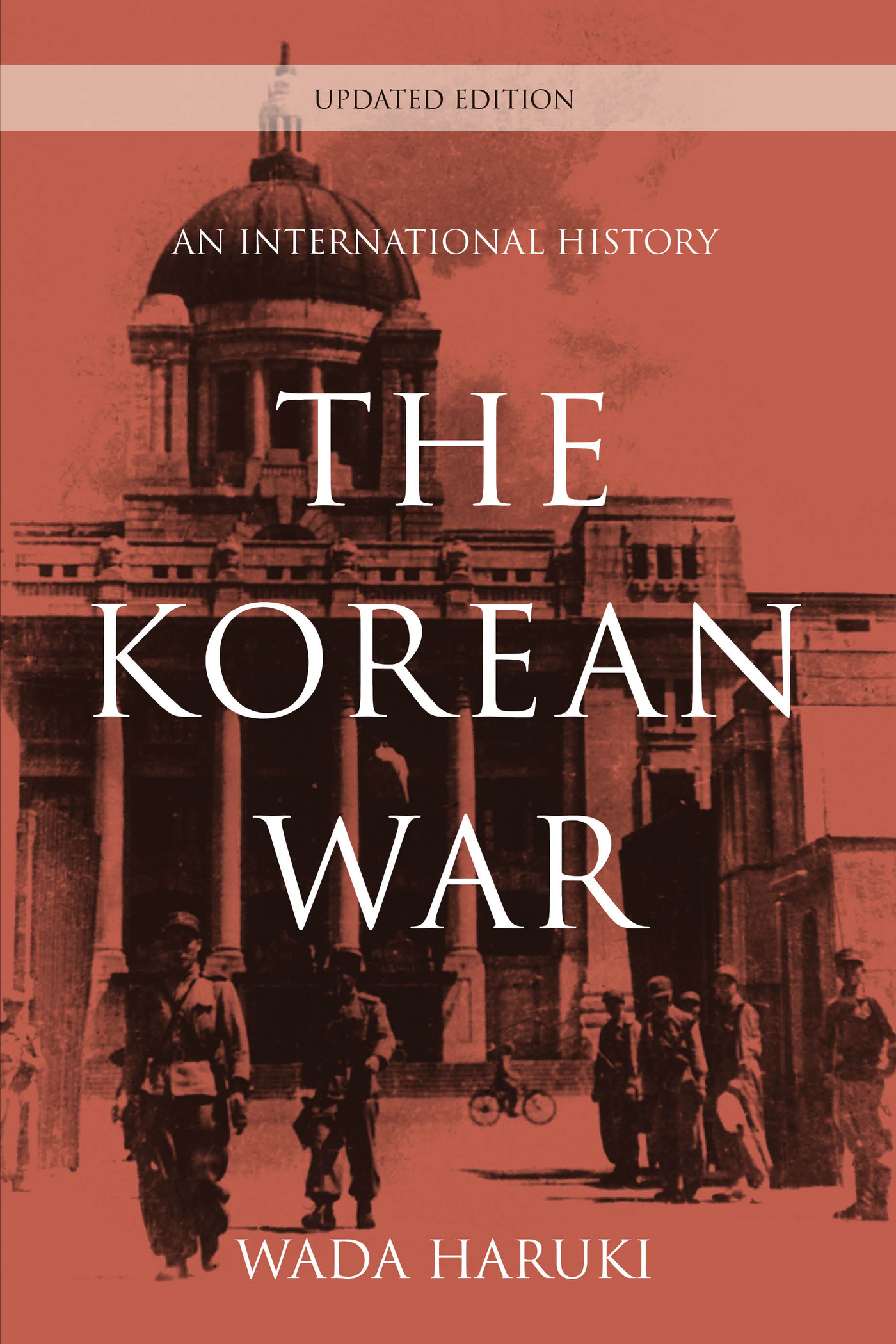The Korean War
An International History
Updated Edition
Wada Haruki
University of Tokyo
Translated by Frank Baldwin
ROWMAN & LITTLEFIELD
Lanham Boulder New York London
Executive Editor: Susan McEachern
Editorial Assistant: Katelyn Turner
Marketing Manager: Lindsey Reinstrom
Published by Rowman & Littlefield
An imprint of The Rowman & Littlefield Publishing Group, Inc.
4501 Forbes Boulevard, Suite 200, Lanham, Maryland 20706
https://rowman.com
Unit A, Whitacre Mews, 26-34 Stannary Street, London SE11 4AB,
United Kingdom
Copyright 2014 by The Rowman & Littlefield Publishing Group, Inc.
Preface to the Updated Edition copyright 2018 by The Rowman & Littlefield Publishing Group, Inc.
All rights reserved. No part of this book may be reproduced in any form or by any electronic or mechanical means, including information storage and retrieval systems, without written permission from the publisher, except by a reviewer who may quote passages in a review.
British Library Cataloguing in Publication Information Available
The first edition of this book was cataloged by the Library of Congress as follows:
Wada, Haruki.
[Chosen Senso zenshi. English]
The Korean War : an international history / Wada Haruki.
pages cm. (Asia/Pacific/perspectives)
Includes bibliographical references and index.
1. Korean War, 1950-1953. I. Title.
DS918.W33613 2013
951.904'2dc23
2013027920
ISBN 978-1-5381-1641-8 (hardcover : alk. paper)
ISBN 978-0-8108-9630-7 (pbk. : alk. paper)
ISBN 978-1-5381-1642-5 (ebook)
 TM The paper used in this publication meets the minimum requirements of American National Standard for Information Sciences Permanence of Paper for Printed Library Materials, ANSI/NISO Z39.48-1992.
TM The paper used in this publication meets the minimum requirements of American National Standard for Information Sciences Permanence of Paper for Printed Library Materials, ANSI/NISO Z39.48-1992.
Printed in the United States of America
Acknowledgments
This volume took shape over more than two decades through extraordinary collaboration. After my first article on North Korean history appeared in 19811982, I spent two months at the University of Washington in 1984 at the invitation of Bruce Cumings, whose monumental two-volume work The Origins of the Korean War inspired my interest in the conflict. Although our understandings of the war differ in several respects, I deeply appreciate his support and friendship.
While working on captured North Korean materials at the Washington National Records Center, Suitland, Maryland in 1983, I became acquainted with independent Korean scholar Pang Sun-joo, who shared his peerless familiarity with the collection. I was assisted at the Russian archives in Moscow by the late Grant Adibekov, archivist of Russian State Archives of Social-Political History, and Gennadii Boldiugov, President of AIRO XX, an independent association of Russian historians on twentieth-century Russia.
Kathryn Weathersby and the Cold War International History Project provided a set of declassified Soviet documents on the war. Without these records this book could not have been written. I treasure the exciting discussions with her and other CWIHP colleaguesChen Jian, Vladislav Zubok, Odd Arne Westad, Aleksandre Mansourov, and David Wolf. I would also like to thank Yurii V. Vanin, Charles Armstrong, Okonogi Masao, and Mizuno Naoki. Korean scholars were particularly generous with insights and assistance, including Moon Jong-in, Park Myung-lim, Yi Chong-sok, Chong Hyon-su, Lee Jong-won, Nam Ki-jong, and the late Suh Dong-man.
This book is an expanded version and translation of Chosen Senso Zenshi (The Korean War: A History) published in 2002 by Iwanami Shoten, whose kind permission made it possible. Gavan McCormack and Mark Selden encouraged me to publish an English version. I am greatly indebted to Frank Baldwin for the translation, accomplished over several years as we struggled to mesh schedules. Chen Jian, as one of the first readers of my manuscript, encouraged the publication and gave important revision advice. Mark Seldens dedicated editing greatly improved the narrative. Tom Wells read the manuscript and made many useful suggestions. I alone am responsible for any errors that remain.
Abbreviations
APRF | Russian Presidential Archives |
AVPRF | Russian Archives of Foreign Policy |
CC | Central Committee |
CCP | Chinese Communist Party |
CPSU | Communist Party of the Soviet Union |
CPV | Chinese Peoples Volunteers |
CWIHP | Cold War International History Project |
DPRK | Democratic Peoples Republic of Korea |
FEAF | Far East Air Forces |
FRUS | Foreign Relations of the United States |
GELC | General Election Leading Committee |
GHQ | General Headquarters |
JCP | Japanese Communist Party |
JCS | Joint Chiefs of Staff |
KLO | Korean Liaison Office |
KMAG | Korean Military Advisory Group |
KPA | Korean Peoples Army (DPRK) |
KWP | Korean Workers Party |
MSB | Maritime Safety Board (Japan) |
NDC | National Defense Corps (ROK) |
NEBDA | Northeast Border Defense Army (China) |
NKWP | North Korean Workers Party |
NSC | National Security Council |
PLA | Peoples Liberation Army (China) |
PRC | Peoples Republic of China |
RGASPI | Russian State Archives on Social-Political History |
ROC | Republic of China |
ROK | Republic of Korea |
ROKA | Republic of Korea Army |
SCAP | Supreme Commander for the Allied Powers |
SKWP | South Korean Workers Party |
TLO | Tactical Intelligence Liaison Office |
TsKhSD | Center for storage of contemporary documents (Russia) |
UNC | United Nations Command |
UNCURK | United Nations Commission for the Unification and Rehabilitation of Korea |
USSR | Union of Soviet Socialist Republics |
Romanization and
Expression of Names
The Romanization of Korean Names
This book uses elements of the McCune-Reischauer system of romanizing Korean. But I dropped the diacritical marks (breve and apostrophe) used to distinguish unaspirated consonants from aspirated consonants and simple vowels from compound vowels. When a specific romanization usage has been sanctioned by history and personal choice, I have not changed that usage.
The Expression of Asian Names
All Asian names are given in normal order, family name first and given name second, such as Kim Il-sung, Mao Zedong, and Yoshida Shigeru. In these cases, Kim, Mao, and Yoshida are family names. But some people express their names in English form, such as Shu Guang Zhang. Here Zhang is the family name.

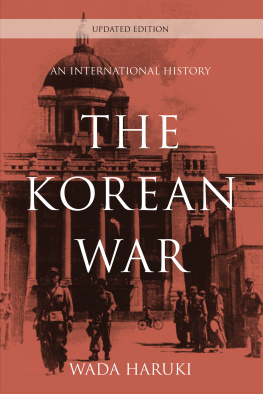
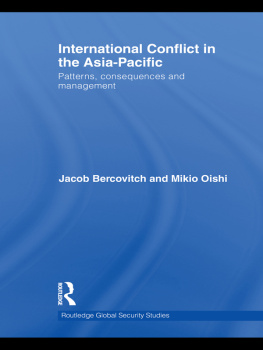

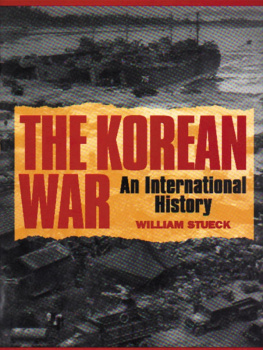
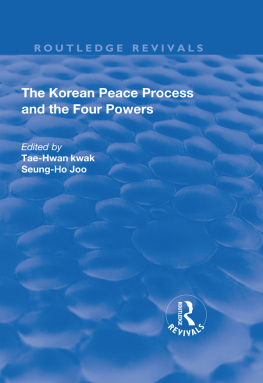
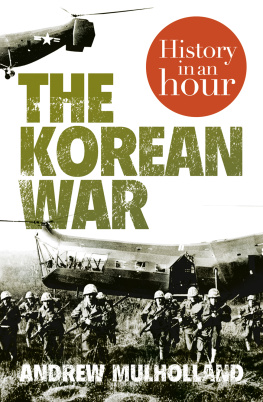
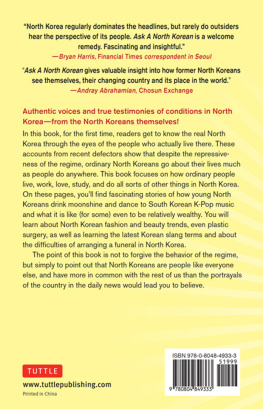
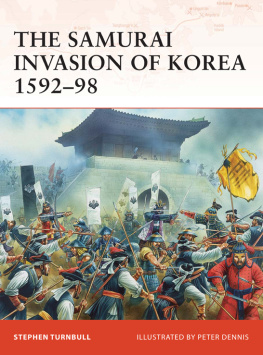
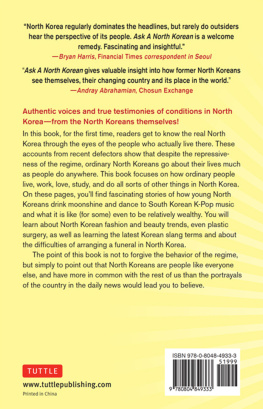

 TM The paper used in this publication meets the minimum requirements of American National Standard for Information Sciences Permanence of Paper for Printed Library Materials, ANSI/NISO Z39.48-1992.
TM The paper used in this publication meets the minimum requirements of American National Standard for Information Sciences Permanence of Paper for Printed Library Materials, ANSI/NISO Z39.48-1992.